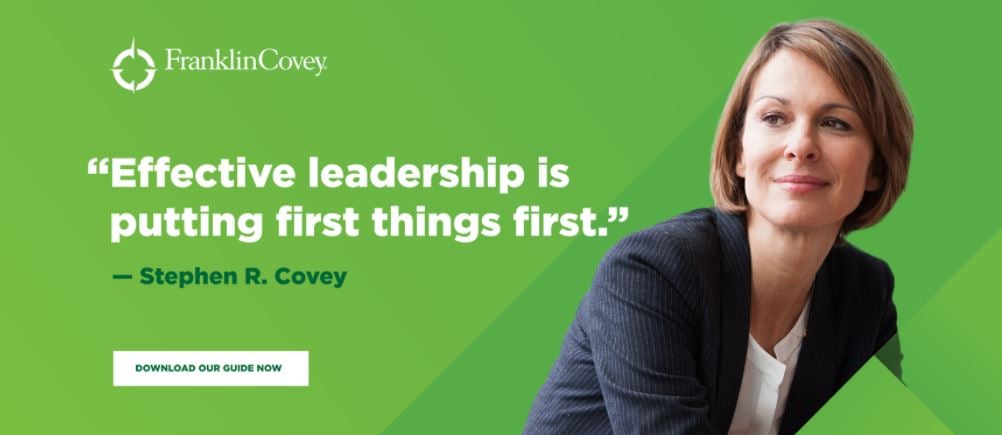We hear a lot about gaining the loyalty of customers and employees.
And I think too often inherent in the statement is an outward thought about how we gain loyalty from them. Rather, shouldn’t the focus be on how we show loyalty to them?
Reminds me of an adage from Dr. Stephen R. Covey when he said, “The best way to build trust with those who are present is to be loyal to those who are absent.” (Chew on that one for a while—that statement alone will transform your leadership style and culture.) Stephen obviously is speaking to the principle that if you want others to be loyal to you, then first be loyal to them. When you refuse to gossip or disparage people who aren’t around you, you show those who are present how you will treat them in the future.
The same standard applies to our businesses. Think about how you can show loyalty to your customers. And it seems quite natural the same will flow back to you.
I frequently see an absence of loyalty from organizations toward their employees. I have countless examples of colleagues who felt unappreciated, unchallenged, and unvalued, who then set out and secured a new role in a different organization. When it comes time to announce their departure to their immediate leader, it often plays out the same way: The leader feels a bit ambushed and betrayed. Frequently the leader feels like they weren’t given a chance to counter the offer (when they actually want the person to stay, sometimes it’s received as a gift from heaven).
When the leader wants the associate to stay, it’s too late to re-recruit them. Too little, too late.
This should have been happening continually over the course of their employment. Often there are regrets on both sides, but what’s done is done. Reminds me of the quote from Blaine Lee, a leader at FranklinCovey, that I share frequently, “Nearly all, if not all, conflict in life comes from mismatched or unfulfilled expectations.” This professional conflict, present in every organization, every day, could be avoided if both sides were open, vulnerable, and working in a high-trust, high-courage culture. The employee would feel safe to share their mindset with their leader, and the leader would do the same. Each would extend pre-forgiveness to the other, but most importantly, the leader would never take the employee’s loyalty lightly. Re-recruiting high performers is not only a leadership competency, it’s a leadership imperative. What are you doing to re-recruit your team members weekly to ensure you’re not ambushed with the departing conversation?
Similarly, in business with your customers and clients, you don’t have a right to exist.
Cashing out your 401(k) to lease a storefront, carefully selecting inventory, taking a few online merchandising courses, and opening your doors comprise one percent of your business strategy. Ninety-nine percent is how you engage those people who walk through the door, in person or virtually.
Let me start this section by stating a fact: We in the Miller family are consumers.
Big time. I shop frequently at brick-and-mortar stores for clothes, toys, and sporting equipment for our three sons. In the summertime, it seems like there are weekly, if not daily, trips for popsicles, ice cream, water balloons, books, and another baseball or basketball that is “lost forever, Dad.” My wife, to my frequent financial horror, is an Amazon Ninja. Forget four-letter words—the worst word in our home is five letters: PRIME. “But it’s free shipping” has long ago fallen on my deaf ears. You know it’s a problem when your spouse knows the UPS, FedEx, Amazon, and USPS delivery personnel by name (and they change with some frequency).
All this to say I can’t recall a time in recent history when a business owner or employee actually looked me in the eye during any part of our transaction and thanked me for my business. It seems to be a lost art, a lost business principle. One exception stands out, and that’s Dean Pierose who owns Cucina, a restaurant and wine bar in The Avenues area of Salt Lake City. This small restaurant has somehow managed to thrive during the pandemic’s economic devastation, and I think it’s less because of the food (although it’s delicious) and ambiance (it’s actually quite understated). But more so because of the personal connections Dean makes with every guest.
I’ve eaten there about forty times over the past two years, and in every encounter, Dean shakes my hand (less so now), engages me at the cash register, and most importantly, always looks me directly in the eye and thanks me for coming in. Doesn’t cost him a penny. He doesn’t comp my dessert. He doesn’t overpour my wine. He doesn’t pick up my check. There’s no need. He’s simply loyal to me—and I am fiercely loyal back.
Channel a bit more Dean in your day, and you’ll see the results immediately.
